The Oscars as
always are a mixed bag, often better for the couture
than for the films that grab the gold. The
Green Book was not a dreadful film and it may well pass the ten-year test,
making the cable movie channel rounds a decade from now. But the Driving Mr Shirley plotline,
cringe-worthy ending around the Christmas tree, and Viggo Mortenson’s noble (failed)
attempt to make Italians look like Vikings (or vice versa) do not a great
picture make. It certainly wasn’t as original or well done as Black Panther, The Favourite or Roma, or for that matter Cold War, If Beale Street Could Talk, or
Leave No Trace, none of the last
three even getting a best pic nomination.
Which films will still matter in, say, 20 years? That test probably brings
the list of worthy 2018 films down to just three: Roma, Cold War and The Favourite.
A 50-year test might include Cold War
alongside Roma, but only the
latter is likely still to be considered a great film a century from now.
It will be
interesting to see who, if anyone, pairs Roma
up with Black Girl,
Ousmane Sembène’s 1966
debut about a young woman who moves from Dakar to Antibes to work as a domestic
servant. Today, Black Girl often occupies
the slot of “founding film” for African cinema, a role in US cultural history
that used to belong to the racist Klan epic, Birth of a Nation[i]. Black
Girl and Roma would make a great
double-bill, but I suspect the latter will look more like an homage to Italian
neo-realism (turning the title into a subtle, possibly delicious pun). But Black Girl isn’t even Sembène’s
second or third best film.
Prizes are
always crazy and yet they have real-world consequences. What makes the Oscars
is the opportunity to look at the stars vamping in great outfits, and isn’t
that what made Busby Berkeley a hit 80 years ago? The Pulitzer gets coverage
from every news organization because it’s about
them[ii], but
the creative awards have been random at best, great one year, head-scratching
the next. I haven’t met a young writer who could tell me the last half-dozen
winners of the Yale Younger Poets award in decades but when I was in college
pretty much every MFA candidate could recite them without blinking. The
MacArthur may bring fortune, but seldom fame – and generally has done a better
job representing art forms other than literature. The Levinson Prize, the one literary award in
the US that pre-dates the Pulitzer, is all but anonymous.[iii]
Having given awards to Pearl Buck and William Golding, the currently-suspended
Nobel Prize in literature is hardly in any position to serve as a model of the
process. When Czeslaw Milosz won the prize in 1980, it’s unlikely that many poets
in the Bay Area – with a few very notable exceptions – considered him among the
five best poets in Berkeley. For his accomplishment, the University of
California did give him its most coveted award, a parking spot in his own name.
What is the
purpose of such competition in the arts? The oft-cited purpose of awarding
excellence would come across as more real if in fact excellence even appeared
to remotely be a criterion. Calling attention to the medium itself seems a more
likely, and more justifiable, goal. The Oscars are an ad for the movies just as
the Pulitzer is an ad for poetry. Quite a few other awards exist to argue that
different configurations of judges might be at least as well-qualified to
identify excellence in a given field. And prizes like the American Book Awards
and Lambda prizes do a lot of good simply pointing out that there is more to
literature than cisgender white males.[iv]
But what is the
value in an ad for the medium? There appears to be some evidence that sales for
award-winning films get a tic upward after receiving a major prize. But a
secondary award, like best director or best foreign language film? Too bad for Roma, which will have to make do with
glowing reviews and great word-of-mouth, where a win might have triggered a
broad release in US theaters, still a good way to see a movie. Cold War continues to be a wonderful flic,
the greatest Jerzy Koziński tale Truffaut ever filmed.[v]
But mostly, it’s apt to remain a secret.
[i] One could argue that this alone tells you all you need
to know about the history of colonialism in each place.
[ii] Which means that the end of print journalism, already
quite visible on the horizon, will render the Pulitzers moot, at least as
presently constituted.
[iii] Having won one, I know.
[iv] The Nobel gave awards to Selma Lagerlöf
and Rabindranath Tagore within its first 15 years, and yet its long-term record
hasn’t been especially good, 100 prizes to men, just 14 to women, the majority
since 1990 Even within the last three decades, nearly twice as many men as
women have received the award. Prizes to writers in English outnumber any other
language by more than two to one. Of non-European languages, only Chinese and
Japanese have received more than one prize. Tagore was the first and last
Bengali writer to receive the award, and much of his writing was in English.
[v] Even though neither had anything to do with it.






